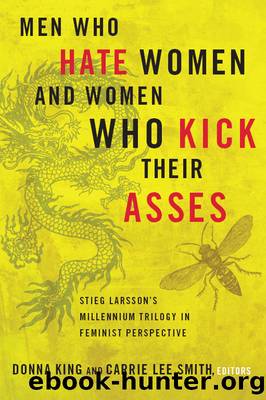Men Who Hate Women and Women Who Kick Their Asses by Donna King Carrie Lee Smith

Author:Donna King, Carrie Lee Smith [Donna King, Carrie Lee Smith]
Language: eng
Format: epub
Tags: Feminism, Sociology
ISBN: 9780826518507
Goodreads: 13043619
Publisher: Vanderbilt University Press
Published: 2012-07-13T00:00:00+00:00
Hacker Justice and the Limits of Feminist Gains
Salander does not embrace a traditional feminist ethic of solidarity with other women and political organizing for womenâs justice. She does, however, live by a strong ethic of feminist-hacker justice. In many ways, Salanderâs feminist-hacker ethic is a response to the failures of the avowedly feminist Swedish state to actually protect women from patriarchal violence. As such, the novels serve as a critique of institutionalized feminism. Developing a new feminist ethic, one based on and integrating new technologies, Salander is dedicated to seeking justice against those who abuse their power or abuse others, particularly men who abuse women.
Salanderâs system of justice is also a direct response to her own experiences of encountering abuse and learning not to rely on the state, the legal system, or any authority to defend her rights. She grew up in a context where there were virtually no adults who cared about her well-being. At eighteen, she is described as not knowing any girls who hadnât been forced sexually. However, âher circle of acquaintances was not large, nor did it contain any members of the sheltered middle class from the suburbsâ (Dragon Tattoo, 249). Rape and sexual assault were not seen as reasons to cry or to file police reports; they were part of the natural order of things for women with minimal social and class status. The feminist struggle to name these private experiencesâto educate women about them and provide material resources to protect and support womenâhad not reached the world that Salander lived within.
This tragedy of feminist insights not reaching the most vulnerable women means that Salander is forced to develop her own strategies for navigating patriarchal culture, and her own political framework for challenging the oppression she faces. Traditional feminist struggle, based on a politics of solidarity and of making private traumas public, is not part of Salanderâs milieu, as it has been co-opted by the Swedish state enforcing her marginalization. Where institutions fail to protect her, technology fills in as a means of feminist education and self-defense.
Salanderâs friends may be few and far between, but when she needs to, she can call on a motley crew to back her up. Larsson dubs this international network the âHacker Republic,â and I donât think this is just an interesting moniker. For Salander, the republic is the closest thing to a family she has, and it is where her allegiance lies. Her difficulty in dealing with flesh and blood people does not limit her ability to connect with other hacker geniuses, and it is in this online venue where they are in their element. Like Salander, the citizens of the Hacker Republic function within their own ethical framework: they critique those spreading viruses online and stand up for their fellow citizens with everything they have. Without even knowing Salanderâs situation, the sixty-two citizens of the Hacker Republic threaten to destroyâor at least destabilizeâthe Swedish state to protect Salander. The Hacker Republic shows incredible loyalty to its citizenry. While
Download
This site does not store any files on its server. We only index and link to content provided by other sites. Please contact the content providers to delete copyright contents if any and email us, we'll remove relevant links or contents immediately.
The Power of Myth by Joseph Campbell & Bill Moyers(1057)
Half Moon Bay by Jonathan Kellerman & Jesse Kellerman(979)
Inseparable by Emma Donoghue(976)
A Social History of the Media by Peter Burke & Peter Burke(976)
The Nets of Modernism: Henry James, Virginia Woolf, James Joyce, and Sigmund Freud by Maud Ellmann(900)
The Spike by Mark Humphries;(809)
The Complete Correspondence 1928-1940 by Theodor W. Adorno & Walter Benjamin(783)
A Theory of Narrative Drawing by Simon Grennan(775)
Culture by Terry Eagleton(771)
Ideology by Eagleton Terry;(733)
World Philology by(712)
Farnsworth's Classical English Rhetoric by Ward Farnsworth(711)
Bodies from the Library 3 by Tony Medawar(707)
Game of Thrones and Philosophy by William Irwin(707)
High Albania by M. Edith Durham(699)
Adam Smith by Jonathan Conlin(687)
A Reader’s Companion to J. D. Salinger’s The Catcher in the Rye by Peter Beidler(686)
Comic Genius: Portraits of Funny People by(649)
Monkey King by Wu Cheng'en(647)
